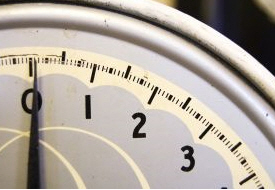 Doctors are now more verbal about the links between the Standard Western Diet and the majority of obesity in individuals who lives in the United States. This particular diet stresses foods which are high in fat, calories and sugar. And, because people often have less time in their day for extended exercise, weight gain has become a common problem. (1) New research, sponsored by the dairy industry, has suggested that including calcium in the diet has a positive effect on weight loss. In fact, the dairy industry has produced an entire advertising campaign around the concept of increasing calcium through dairy products and weight loss. (2)
Doctors are now more verbal about the links between the Standard Western Diet and the majority of obesity in individuals who lives in the United States. This particular diet stresses foods which are high in fat, calories and sugar. And, because people often have less time in their day for extended exercise, weight gain has become a common problem. (1) New research, sponsored by the dairy industry, has suggested that including calcium in the diet has a positive effect on weight loss. In fact, the dairy industry has produced an entire advertising campaign around the concept of increasing calcium through dairy products and weight loss. (2)
Many of the studies which the American Dairy Association rely on in their advertising have found a link between the amount of calcium an individual consumes during the day and the type of weight which is lost in the body. This link appears to be in the amount of calcium being stored and the current weight of the individual.
Advertising campaigns point to research which showed a relationship between eating three to four servings of low-fat dairy products each day and a decrease in the amount of fat stored in the body. This research suggested that calcium increases the amount of fat in the body that converts to energy by increasing the body’s core temperature. The theory is that by increasing the core temperature the body will burn more calories at a faster rate. (3)
The study also suggested that individuals who have the highest amount of stored fat will also show the lowest amount of calcium stored in the body.
Conversely, popular diets that promise a quick weight loss are often very low in dairy products, the foods containing the highest amounts of calcium. These popular fad diets also affects the ability of the body to absorb calcium which can lead to bone loss and osteoporosis. Women who control their calories each day can be at risk for a number of deficiencies because they miss vital vitamins and minerals necessary for overall health.
Foods that are high in calcium include milk, cheese, yogurt, ice cream, baked beans, dried figs, broccoli and most dark leafy vegetables. The research funded by the American Dairy Association did not include vegetable sources of calcium in their study.
Dr. Reed Mangels, from the Vegetarian Resource Group, also comments on the influence that high amounts of animal protein have on our bodies. Quoting a study published in the Journal of Nutrition in 2003 he states that “Some studies show that diets that are high in protein, especially animal protein, do cause increased losses of calcium in the urine…” this means that the amount of calcium in the Recommended Daily Allowance may fluctuate for individuals based on the amount of animal protein they consume. (4,5)
 The current recommended dose for calcium is 800 to 1000 mg per day. Most Americans usually consume between 500 and 700 mg. Unless a diet is high in foods that contain calcium, many Americans may find that supplementation is necessary to avoid the increased loss of bone and osteoporosis while taking advantage of the potential for weight loss. However, it is also important to note that the production of bone does not rely exclusively on the amount of calcium in the body. Several other vitamins and minerals are necessary in order for the body to adequately manufacture bone.
The current recommended dose for calcium is 800 to 1000 mg per day. Most Americans usually consume between 500 and 700 mg. Unless a diet is high in foods that contain calcium, many Americans may find that supplementation is necessary to avoid the increased loss of bone and osteoporosis while taking advantage of the potential for weight loss. However, it is also important to note that the production of bone does not rely exclusively on the amount of calcium in the body. Several other vitamins and minerals are necessary in order for the body to adequately manufacture bone.
Unfortunately, it may just be convenient to believe that increasing the amount of calcium in the diet will also increase the amount of weight that you can lose. Weight loss is always dependent on the number of calories eaten versus the number of calories burned. The number of calories burned by increasing the core temperature of the body through stored calcium may not be great enough to offset the potential risk for the development of kidney stones. The American Journal of Clinical Nutrition, April 2005, carried reports of research which contradicts the reported weight loss which other studies had shown. (6)
The conclusion? Before beginning any weight loss program, a new exercise regimen or changing your diet significantly you should consult your physician-especially if you are under 18, pregnant, nursing or have a pre-existing health problem. Before increasing the amount of calcium you take you should also establish the amount of your current intake of calcium as well as other vital vitamins and minerals. At that point, working with the nutritionist, you can develop a specific diet that meets your caloric needs, the nutritional needs of your body and will help you to attain the goals you seek.
The current results of studies which link calcium and weight loss are not conclusive and much more research is required before a judgment can be drawn.
References:
(1) Center for Disease Control and Prevention: Adult Obesity Facts
http://www.cdc.gov/obesity/data/adult.html/
(2) American Associates Ben-Gurion University of the Negev: Higher Dairy Calcium Intake and Increased Serum Vitamin D Are Related to Greater Diet-Induced Weight Loss, Israeli Study Finds
http://www.sciencedaily.com/releases/2010/09/100921084551.htm
(3) Journal of the American Board of Family Medicine: Ditary Calcium Intake and Obesity
http://www.jabfm.org/content/18/3/205.full?ijkey=a106b6c501549ead1718258d323ffe9847127735&keytype2=tf_ipsecsha
(4) American Journal of Clinical Nutrition: A high ratio of dietary animal to vegetable protein increases the rate of bone loss and the risk of fracture in postmenopausal women. Study of Osteoporotic Fractures Research Group.
http://www.ncbi.nlm.nih.gov/pubmed/11124760
(5) The Journal of Nutrition: Low Protein Intake: The Impact on Calcium and Bone Homeostasis in Humans
http://jn.nutrition.org/content/133/3/855S.full
(6) The American Journal of Clinical Nutrition: The Effect of Soy Protein and Soy Isoflavones on Calcium Metabolism in Postmenopausal Women
http://www.ajcn.org/content/81/4/916.full


Leave a Reply